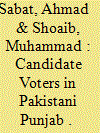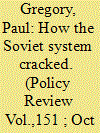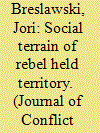|
|
|
Sort Order |
|
|
|
Items / Page
|
|
|
|
|
|
|
| Srl | Item |
| 1 |
ID:
170120


|
|
|
|
|
| Summary/Abstract |
Candidate voters are a significant percentage of the electorate in Pakistani Punjab. Consideration of the last three National Assembly elections shows a consistent attitude: Punjabi voters care more about candidates than they do about political parties. Political parties attract voters in urban districts, but they rely on “electables” (candidates with strong personality and loose party affiliation) in semi-urban and rural districts.
|
|
|
|
|
|
|
|
|
|
|
|
|
|
|
|
| 2 |
ID:
084523


|
|
|
| 3 |
ID:
144089


|
|
|
|
|
| Summary/Abstract |
Violence against civilians is not the only tool among the arsenal of terrorists; it is only one of many. Up until now, there did not exist any quantitative data on the different strategies adopted by terror groups that measured the group’s popularity or its public support. The Reputation of Terror Groups dataset (RTG) addresses this void. To understand which terror groups build different types of reputation, to analyze the consequences of reputation building and how reputation changes with and influences conflict dynamics, we need to be able to measure the loaded concept of reputation. RTG is the first systematic measure for the reputation of terror groups across countries or time. The dataset includes 443 terror groups operating across 31 years, which makes a total of 2,641 observations. The large sample size of the RTG dataset allows comparisons of popularity among groups. Additionally, the dataset adopts a multivariable approach by examining multiple aspects of both positive and negative reputation building. Another novelty of the dataset is its measure of reputation with regard to each target, mainly its constituency and target audience. The RTG data can help us come up with new and novel ways of understanding terror groups, and contribute to bridging the gap between micro- and mezzo-level studies in the literature by showing how terror groups adopt different strategies in their constituency and target audience to pursue their goals. In this article, we give an overview assessment of the RTG dataset, display some interesting trends in the data, and explain the data collection procedure, its challenges, and its limitations.
|
|
|
|
|
|
|
|
|
|
|
|
|
|
|
|
| 4 |
ID:
177026


|
|
|
|
|
| Summary/Abstract |
The extent of local order varies widely in rebel held areas, from total chaos to well-run governing institutions. When these institutions exist, why do some include civilian input in local affairs, while others exclude civilians from governance? I argue that rebels choose different governing strategies that maximize their utility of territorial control, based on certain characteristics of civilian inhabitants populating the territory. Rebels’ constituency determines whether rebels seek to govern civilians or control them solely with coercive violence, and community cohesion (or lack thereof) then determines the type of institutions that rebels develop. I focus on three different outcomes for communities under rebel control—no institutions, exclusive institutions, and inclusive institutions. I test my argument using historical, statistical, and case evidence, leveraging original cross-national data on local order in rebel held territory as well as interviews with village heads, ex-combatants, and community members in Aceh, Indonesia.
|
|
|
|
|
|
|
|
|
|
|
|
|
|
|
|
| 5 |
ID:
099076


|
|
|
|
|
| Publication |
2010.
|
| Summary/Abstract |
After the expenses scandal, it is time to ask what Members of Parliament are for. The traditional formal arguments are inadequate as they fail to engage with what MPs actually do. A typology is useful in illuminating the different ways in which MPs see their role: as Lickspittles, Loyalists, Localists, Legislators, Loners and Loose Cannons. Current trends in the performance of these roles can be identified, raising questions about the nature of politics and the vitality of Parliament.
|
|
|
|
|
|
|
|
|
|
|
|
|
|
|
|
| 6 |
ID:
153293


|
|
|
|
|
| Summary/Abstract |
Members of the British Labour party have, not for the first time, criticised the Boundary Commissions’ proposals for new constituency boundaries as gerrymandering. This represents a misuse of the term: the Commissions have produced recommended constituencies in the context of new rules for such redistributions that give precedence to equality of electorates across all seats and the boundaries of those constituencies have been defined without any reference to the likely electoral consequences. The Conservatives, who were responsible for the change in the rules to emphasise electoral equality, wanted to remove a decades-long Labour advantage in the translation of votes into seats because of variations in constituency size, and the Commissions’ implementation of those rules has achieved that. A Labour advantage has been removed but not replaced by a Conservative advantage: in terms of electoral equality between the two, the playing field has been levelled. Labour's claim to have been disadvantaged by decisions on the electoral register is also examined; the disadvantage is probably only small.
|
|
|
|
|
|
|
|
|
|
|
|
|
|
|
|
|
|
|
|
|